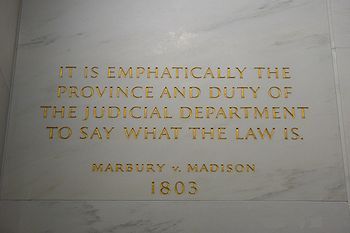This is your morning Open Thread. Pour your favorite beverage and review the past and comment on the future.
Find the past “On This Day in History” here.
February 26 is the 57th day of the year in the Gregorian calendar. There are 308 days remaining until the end of the year (309 in leap years).
Two national parks preserved, 10 years apart. The two national parks were established in the United States 10 years apart, the Grand Canyon in 1919 and the Grand Tetons in 1929.
The Grand Canyon National Park
U.S. President Theodore Roosevelt visited the Grand Canyon in 1903. An avid outdoorsman and staunch conservationist, he established the Grand Canyon Game Preserve on November 28, 1906. Livestock grazing was reduced, but predators such as mountain lions, eagles, and wolves were eradicated. Roosevelt added adjacent national forest lands and redesignated the preserve a U.S. National Monument on January 11, 1908. Opponents such as land and mining claim holders blocked efforts to reclassify the monument as a U.S. National Park for 11 years. Grand Canyon National Park was finally established as the 17th U.S. National Park by an Act of Congress signed into law by President Woodrow Wilson on February 26, 1919.
In 1897 acting Yellowstone superintendent Colonel S.B.M. Young proposed expanding that park’s borders south to encompass the northern extent of Jackson Hole in order to protect migrating herds of elk. Next year, United States Geological Survey head Charles D. Walcott suggested that the Teton Range should be included as well. Stephen Mather, director of the newly-created National Park Service and his assistant Horace Albright sent a report to Secretary of the Interior Franklin Lane in 1917 stating much the same. Wyoming Representative Frank Mondell sponsored a bill that unanimously passed the United States House of Representatives in 1918 but was killed in the United States Senate when Idaho Senator [John Nugent feared that the expansion of Park Service jurisdiction would threaten sheep grazing permits. Public opposition to park expansion also mounted in and around Jackson Hole. Albright, in fact, was practically run out of Jackson, Wyoming, by angry townspeople in 1919 when he traveled there to speak in favor of park expansion.
Local attitudes started to change that same year when proposals to dam Jenny, Emma Matilda, and Two Ocean lakes surfaced. Then on July 26, 1923, local and Park Service representatives including Albright met in Maud Noble’s cabin to work on a plan to buy private lands to create a recreation area to preserve the “Old West” character of the valley. Albright was the only person who supported Park Service management; the others wanted traditional hunting, grazing, and dude-ranching activities to continue. In 1927 philanthropist John D. Rockefeller, Jr. founded the Snake River Land Company so he and others could buy land in the area incognito and have it held until the National Park Service could administer it. The company launched a campaign to purchase more than 35,000 acres for $1.4 million but faced 15 years of opposition by ranchers and a refusal by the Park Service to take the land.
In 1928, a Coordinating Commission on National Parks and Forests met with valley residents and reached an agreement for the establishment of a park. Wyoming Senator John Kendrick then introduced a bill to establish Grand Teton National Park. It was passed by both houses of the U.S. Congress and signed into law by U.S. President Calvin Coolidge on February 26, 1929. The 96,000 acres park was carved from Teton National Forest and included the Teton Range and six glacial lakes at its foot in Jackson Hole. Lobbying by cattlemen, however, meant that the original park borders did not include most of Jackson Hole (whose floor was used for grazing). Meanwhile the Park Service refused to accept the 35,000 acres held by the Snake River Company.
Discouraged by the stalemate, Rockefeller sent a letter to then U.S. President Franklin D. Roosevelt telling him that if the federal government did not accept the land that he intended to make some other disposition of it or to sell it in the market to any satisfactory buyers. Soon afterward on March 15, 1943 the president declared 221,000 acres (890 km2) of public land as Jackson Hole National Monument. Continued controversy over the Rockefeller gift still made it impossible for the monument to officially include that land, however.
Opposition to the monument by local residents immediately followed with criticism that the declaration was a violation of states’ rights and that it would destroy the local economy and tax base. Ranchers, led in part by famed actor Wallace Beery, drove 500 cattle across the newly created monument in a demonstration designed to provoke conflict. The Park Service did not respond to the stunt but the event brought national attention to the issue nonetheless. Wyoming Representative Frank A. Barrett introduced a bill to abolish the monument that passed both houses of Congress but was pocket vetoed by Roosevelt. U.S. Forest Service officials did not want to cede another large part of the Teton National Forest to the Park Service so they fought against transfer. One final act was to order forest rangers to gut the Jackson Lake Ranger Station before handing it over to park rangers. Residents in the area who supported the park and the monument were boycotted and harassed.
Other bills to abolish the monument were introduced between 1945 and 1947 but none passed. Increases in tourism money following the end of World War II has been cited as a cause of the change in local attitudes. A move to merge the monument into an enlarged park gained steam and by April, 1949, interested parties gathered in the Senate Appropriation Committee chambers to finalize a compromise. The Rockefeller lands were finally transferred from private to public ownership on December 16, 1949, when they were added to the monument. A bill merging most of Jackson Hole National Monument (except for its southern extent, which was added to the National Elk Refuge) into Grand Teton National Park was signed into law by President Harry S. Truman on September 14, 1950. One concession in the law modified the Antiquities Act, limiting the future power of a president to proclaim National Monuments in Wyoming. The scenic highway that extends from the northern border of Grand Teton National Park to the southern entrance of Yellowstone National Park was named the John D. Rockefeller, Jr. Memorial Parkway to recognize Rockefeller’s contribution to protecting the area. In 2001, the Rockefellers donated their Jackson Hole retreat, the JY Ranch, to the national park for the establishment of the Laurance S. Rockefeller Preserve, dedicated on June 21, 2008.


 On this day in Japan, the Plum Blossom Festival is held. The Festival at the
On this day in Japan, the Plum Blossom Festival is held. The Festival at the 
 On this day in
On this day in  On this day in 1954, a group of
On this day in 1954, a group of  By 1910, much of the world experienced a dramatic increase in polio cases and frequent epidemics became regular events, primarily in cities during the summer months. These epidemics-which left thousands of children and adults paralyzed-provided the impetus for a “Great Race” towards the development of a vaccine. Developed in the 1950s, polio vaccines are credited with reducing the global number of polio cases per year from many hundreds of thousands to around a thousand. Enhanced vaccination efforts led by the World Health Organization, UNICEF, and Rotary International could result in global eradication of the disease.
By 1910, much of the world experienced a dramatic increase in polio cases and frequent epidemics became regular events, primarily in cities during the summer months. These epidemics-which left thousands of children and adults paralyzed-provided the impetus for a “Great Race” towards the development of a vaccine. Developed in the 1950s, polio vaccines are credited with reducing the global number of polio cases per year from many hundreds of thousands to around a thousand. Enhanced vaccination efforts led by the World Health Organization, UNICEF, and Rotary International could result in global eradication of the disease.
Recent Comments